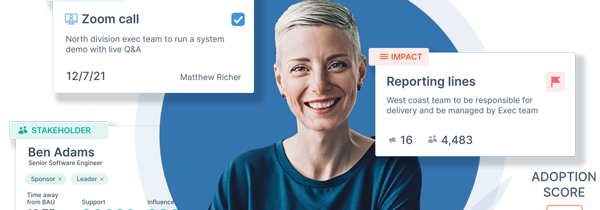Thinking about Organizational Change
Can your team discern the various types of organizational change and their impacts?
This module explains the distinction between incremental and transformational change, explores the features of organizations upon which change operates and describes how the support of stakeholders at all levels of seniority maximizes the likelihood of change initiative success.
BUY THIS WORKSHOP TRAINING MODULE
INCLUDES
12 page facilitator guide
4 engaging training activities
24 slide presentation deck
3:30 min summary video
7 handouts
6 resources in reading guide
$495.00
has been added to your cart!
have been added to your cart!
30 DAY GUARANTEE
Materials included
Summary Video
DURATION: 3:30 MINS
Explains concepts in a concise, memorable manner. Includes a bulleted summary at the conclusion and matching job-aid handout PDF.
Facilitation Guide
PAGES: 12
Comprehensive yet easy-to-follow instructions for facilitating workshops with the above training activities. Includes useful tips and sample answers to questions. No expertise in the topic area is required.
Presentation Slide Deck
SLIDES: 24
For use during workshops in both PDF & editable PPT formats. Slide numbers for each activity are referenced in the Facilitation Guide.
Reading Guide
RESOURCES LISTED: 6
Useful for participants wishing to deep dive into the module topic with links to the web's best articles, books and tools. PDF format.
Activity Handouts
Everything you need to facilitate successful training activities.
- Appreciative enquiry worksheet
- Changing Me – self assessment
- Commitment to change postcards
- Job-aid summary
- Likert scale numbers 1 to 10
- Terminology flash cards
Tools & Templates
Used during training activities. These can also be used for change implementation.
- Appreciative Inquiry Worksheet
- Personal change readiness self-assessment
Benefits
This module will activate your organization to:
- assure stakeholders that change is a process that organizations must undergo in order to align themselves with a shifting environment
- appreciate the variety of forces and influences that compel organizations to undergo change
- understand the distinction between change management initiatives and continuous improvement efforts
- ensure senior leaders have a common conception of organizational change prior to embarking upon a change initiative
- bring together a change management leadership team
- brief those responsible for a quality or continuous improvement process on the nature of a change initiative
This module will empower your teams and individuals to:
- understand the types of changes that organizations undergo
- recognize the main features of organizations upon which change initiatives focus
- recognize that change initiatives may operate upon various levels within organizations
- appreciate the role of dedicated change leaders in managing and sustaining change initiatives
This module is ideal for use at this stage of change implementation:
| Pre-implementation | During Implementation | Post-implementation |
Training Activities
Summary Video & Discussion
TARGET AUDIENCE: All learners SUGGESTED TIMING: 15 - 30 minutes
The module subject-matter is introduced using a short animated video. The knowledge check and personal reflections questions are then used to explore learners’ understanding and experience before moving on to other connected activities.
Facilitators can make use of a range of techniques such as brainstorming or debates to explore the knowledge check questions.
Use examples of learners’ experiences in the activities which follow.
Attitudes to Change
TARGET AUDIENCE: All learners SUGGESTED TIMING: 10 - 15 minutes
This activity performs the dual purpose of preparing learners for the self- assessment activity later in this module, while giving the facilitator essential information about the learners taking the course which will enable them to mold and direct the course as it progresses.
It then progresses to a short experiment which brings home to learners what their subconscious reaction to change is.
Appreciative Enquiry
TARGET AUDIENCE: All learners SUGGESTED TIMING: 40 - 50 minutes
This activity continues the self-discovery started in the previous activity and further develops the facilitator’s understanding of the learners on the course. In particular, it gives the learner an appreciation of what they have achieved so far in their career and how well their organization is doing.
Self Assessment: "Changing Me"
TARGET AUDIENCE: All learners SUGGESTED TIMING: 30 minutes
In this activity, learners have the opportunity to develop a greater understanding of their attitude to change and the sources of and influences on these attitudes. Since this is likely to be deeply personal, group discussion of the results is not recommended. The facilitator can collect in the sheets to review and deepen their understanding of people’s needs and attitudes, but should hand them back later.
Compatibility Guide
This module will boost engagement levels during the following change methodology stages:
| Change management methodology / approach | Stage / phase |
| AIM (Accelerated Implementation Methodology) | Build Change Agent Capability |
| Prosci Enterprise Change Management Model | Vision |
| Bridges Leading Transition Model for Change | Letting Go |
| Beckhard and Harris Change Management Process | Creating vision and values |
| John Kotter Eight Step Model for Change | Developing a Change Vision |
| ADKAR Model for Change Management | Awareness |
| The Change Leader’s Roadmap model | Phase I – Prepare to Lead the Change |
| LaMarsh Change Management Model | Plan and Prepare the Change |
| People Centered Implementation (PCI) Model | Effective Change Leadership |
| Viral Change Roadmap Model | Discovery |
| General Electric Change Acceleration Process (CAP) | Changing Systems and Structures |
